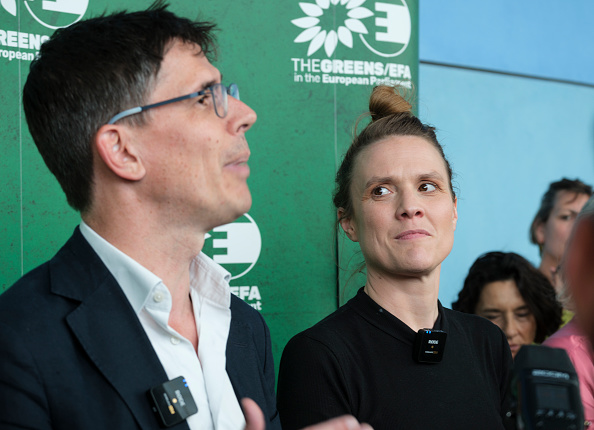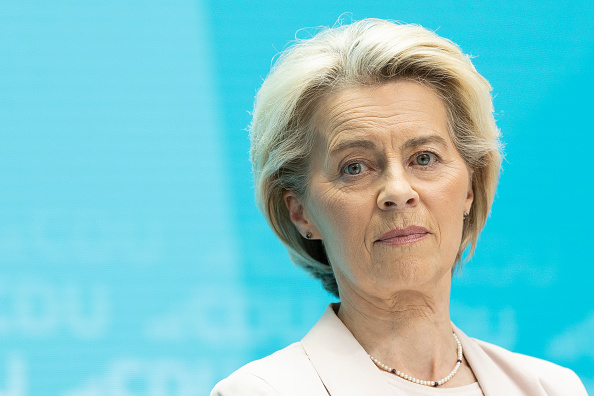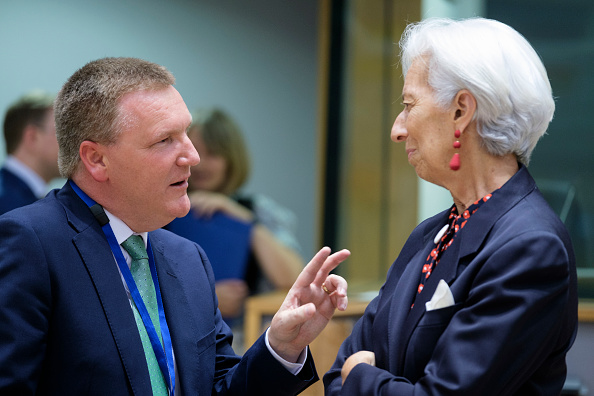As Ursula von der Leyen began her scramble to assemble enough European Parliament votes to stay in office, Germany’s Christian Democrats have denied press reports that many of their MEPs would withhold their votes if von der Leyen–herself a former CDU minister–entered an agreement with the EU’s Greens.
“In my eyes, this is rubbish,” Christian Democrat MEP Dennis Radtke told Brussels Signal.
“The CDU and CSU will vote in favour for Ursula,” he predicted.
Perhaps highlighting the sensitivity of the issue, though, Markus Pieper, a second CDU MEP, told Brussels Signal he “does not wish to comment on the topic”.
Von der Leyen in any case does not have many European Parliament votes to spare.
In the looming secret ballot in July, her coalition of European People’s Party (EPP), Socialists & Democrats (S&D), and Renew has 399 MEPs.
Von der Leyen needs 361 votes to keep her job. If just 10 per cent of her coalition defected in the secret ballot, she would only receive 359, and her candidacy would fail. In 2019, 25 per cent of her coalition voted against her.
Any attempts she could make to widen her coalition were fraught with the danger of losing more votes than she gained.
Giorgia Meloni‘s European Conservatives and Reformists (ECR) bloc was the European Parliament’s third-largest, with 83 MEPs.
However, S&D and Renew have said they would withdraw their support if von der Leyen entered into an agreement with the ECR.
Green MEPs have also told Brussels Signal a von der Leyen deal with Meloni’s bloc was a red line for them as well.
Adding in the Greens would likewise alienate those within the EPP–like Germany’s pro-business CDU–who said their support for von der Leyen was conditional on her abandoning Green Deal policies from her first term, like banning combustion-engine automotive sales after 2035.
(There have been hints some of these Green Deal policies may reappear, in a possible gesture towards the Greens.)
Slimming down von der Leyen’s vote even more, many MEPs from the three blocs that theoretically do support her already have said publicly they will not vote for her.
These included six MEPs from France’s Les Républicains who kept their seats, and four from Ireland’s Fianna Fáil.
Irish Taoiseach Simon Harris was in a delicate position of encouraging his coalition partner Fianna Fáil’s MEPs to vote for von der Leyen, but “does not want to be seen to be putting pressure on them”, said RTÉ’s Europe editor Tony Connelly.
Harris publicly supported von der Leyen’s reelection in June 27’s European Council meeting, and has made no secret of his hopes that Ireland would receive a senior economic portfolio for its new European Commissioner, Michael McGrath.
“It is helpful, now that we have sight of our nominee, for MEPs to reflect on that as well and how they can assist Michael McGrath and assist Ireland in getting the best portfolio possible,” Harris told reporters in Dublin June 27.
If Von der Leyen does not win a majority in the mid-July European Parliament vote, her candidacy fails, and the European Council will have a month to select another candidate.
Croatia’s PM Andrej Plenković would be a likely candidate to take her place, Brussels APCO senior director Nicholas Whyte told Brussels Signal.
Plenković’s Croatian Democratic Union forms part of the European People’s Party, which would be able to nominate another choice, said Whyte.
Plenković, who is both Conservative and pro-European, has won three consecutive elections at home, and is from a Western Balkans region which has previously been neglected in senior EU posts, Whyte added.
Possibly courting even further controversy while her job hangs on the line, von der Leyen is expected to ask each member state to provide both a male and a female candidate for commissioner, as she did in 2019.
Harris replied EU treaties “were clear” that a member state only had to provide one nominee, and that Ireland would not provide a female candidate alongside McGrath, who has already stepped down as finance minister.
“I have huge respect for President von der Leyen. I also have huge respect for the treaties. The treaties are very clear that it’s a matter for a member state to decide who wishes to nominate,” Harris told reporters.
Likewise, France’s President Emmanuel Macron nominated Thierry Breton for a second term as France’s commissioner on June 27, without putting forward a woman candidate.
Rassemblement National president Jordan Bardella protested the move, saying his party should be able to choose the commissioner if it won France’s coming elections.





